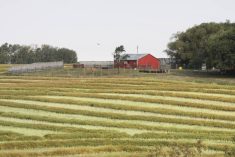A conference call to be held within the next two weeks will set an
action plan for rural women.
Carolyn Van Dine, head of the Canadian Farm Women’s Network, said she
and the 13 other Canadian women who attended an Oct. 2-4 conference in
Madrid, Spain, want to ensure something is done between now and the
next world congress in 2006.
“We do not want to wait for four years from now to do the statistics,”
Van Dine said.
Read Also

Nutritious pork packed with vitamins, essential minerals
Recipes for pork
“We have information on unpaid labour and farm women’s hours of work.
Canada could do a presentation …. There are a lot of things to do to
motivate our government as well as ourselves.”
Van Dine said Canada wants to play a bigger role and be part of the
organizing committee for the next international gathering of the
world’s rural women. The offer by the 14 Canadian delegates was
accepted in Spain, but is not official. The next conference will be in
Africa.
The federal Farm Women’s Bureau will organize the conference call,
which will bring together the leaders of Canada’s five designated farm
women’s groups: the network, the National Farmers Union, the Federation
of Women’s Institutes of Canada, or FWIC, and two Quebec groups.
Maxine Routledge, an FWIC elected official, said the Spanish conference
was disappointing because most of the 95 speakers were politicians,
bureaucrats or academics, rather than farm women.
“I was amazed that these educated people couldn’t tell the time and all
went overtime on their speeches,” she said sarcastically.
That meant there was no time for questions from the delegates, so the
conference mainly involved sitting and listening.
Routledge said the best times in Spain were spent talking with other
delegates.
“A lady from Croatia told me she came from a small town of one million.
My small town is 23,” said Routledge of Lenore, Man.
American farm subsidies were criticized often, she said, but not
European ones.
Van Dine said one of the statistics she remembered from the speeches
was that rural women represent one-quarter of the world’s population.
In Canada, they represent less than two percent.
“There is a wide difference” between the experience of a woman in
Nigeria and one in Canada, she added. “We live in a very privileged
bubble.”
She said the other issue that struck her was that domestic work is
still not valued because its economic worth is not counted. One speaker
suggested the answer is for rural women to become home-based
entrepreneurs.
But Van Dine had a problem with that suggestion: “Who does the
housework and who does the child care? Those jobs still have to be
done.”
Delegate Colleen Ross Whitehead of the NFU’s Ontario branch said she
knew from the agenda that the Spanish conference would be
non-participatory, so she went with the goal of networking. She filled
a suitcase with NFU policies, statements and contacts, and emptied it
by distributing the paper to others.
“This conference was not solution-oriented or grassroots. The next one
will be.”
Ross Whitehead said she met with women from the 167-strong Australian
delegation and agreed to wrestle the next world congress away from
politicians and academics and share information with grassroots women
from developing countries.
“They want to learn from our experiences, our mistakes …. For Canada,
it’s too late. We need to do something for other people.”
















